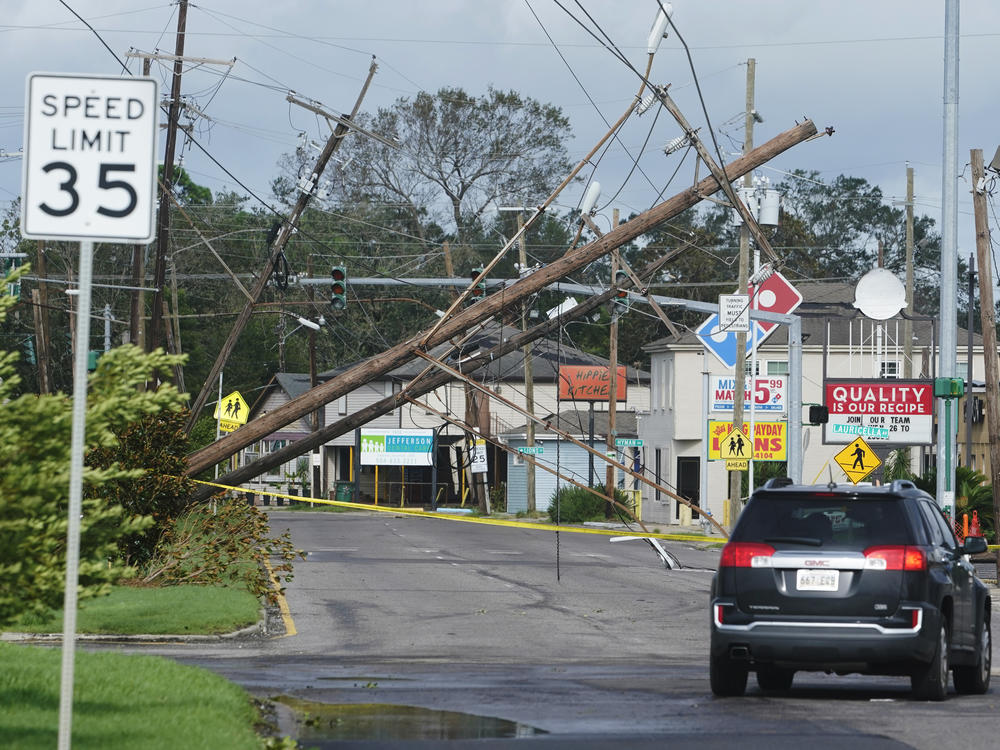Section Branding
Header Content
Louisiana And Mississippi Were Overwhelmed By COVID-19 Cases. Then Ida Struck
Primary Content
Louisiana was already battling its fourth coronavirus surge — and worst one yet — when Ida struck. Here's what that means for hospitals, patients and those seeking shelter (and coronavirus tests):
Hospitals were already crowded with COVID-19 patients
There were 2,450 people hospitalized with COVID-19 as of Saturday, according to Louisiana Gov. John Bel Edwards, who noted that hospitalizations decreased 20% over the previous 10 days but still remained higher than at any point during the pandemic.
Hospitals generally try to discharge as many patients and staff as possible before hurricanes. Louisiana's overcrowded facilities couldn't fully evacuate, however, because so many of their patients are in intensive care units, as NPR member station WWNO reported.
In southern Mississippi, which is also in the storm's direct path, health officials have been diverting critical care patients to hospitals in the northern part of the state. Federal health care teams — which were already responding to the COVID-19 surge in Louisiana and Mississippi — will assist in that effort, Mississippi Gov. Tate Reeves said.
Some health care facilities need to evacuate because of storm damage
Ochsner Health, one of Louisiana's largest hospital systems, says two of its facilities will need to evacuate roughly 60 patients after experiencing flooding, roof damage and generator failures.
As WWNO reported, officials expect to be able to transfer those patients — most of whom are adults — to other facilities within the Ochsner Health System, but were waiting until winds decreased on Monday morning to move them safely.
Two hospitals in Lafourche Parish, near where Ida made landfall Sunday, are also looking to move or evacuate patients due to storm impacts, according to The Associated Press. They reported extensive roof damage and partial generator failure, respectively.
Edwards said on Sunday that the state will focus on making sure hospitals have enough water and generator power to keep up with vital patient needs.
"I hate to say it this way, but we have a lot of people on ventilators today and they don't work without electricity," he said.
Another year of taking shelter in a pandemic
"We have a lot of experience from last year of handling both the threat of a natural disaster and the continued pandemic at the same time," said Dr. Jennifer Avegno, director of the New Orleans Health Department, according to WWNO.
Unlike last hurricane season, at least some portion of the population has gotten vaccinated against COVID-19. According to NPR's state tracker, 41.4% of Louisiana's population has been fully vaccinated, and 49.5% has had at least one dose, as of Aug. 29.
Regardless, the Centers for Disease Control and Prevention advises people staying in public shelters to practice social distancing, wash hands frequently and follow other shelter policies to mitigate risk. Read more tips here.
The risk of COVID-19 in a public disaster shelter is lower for fully vaccinated people, the CDC says, but people should still take precautions because transmission risk is higher in such settings and likely increases with the number of unvaccinated people present.
"Thus, fully vaccinated shelter residents should continue to follow all rules set by the shelter which may include wearing masks correctly, maintaining physical distance (at least 6 feet), covering coughs and sneezes, and washing hands frequently," it advises.
Coronavirus testing and vaccination appointments are on pause
In Mississippi, all testing and vaccination sites run by the state Department of Health will be closed Monday. Those in central and southern counties will remain closed Tuesday and possibly longer, the department said.
The Louisiana Department of Health closed its community-based testing and vaccine sites early Friday, with no further information posted about reopening.
It also said it would be pausing its COVID-19 case and vaccination reporting on Monday due to the storm.
This story originally appeared on the Morning Edition live blog.
Copyright 2021 NPR. To see more, visit https://www.npr.org.

